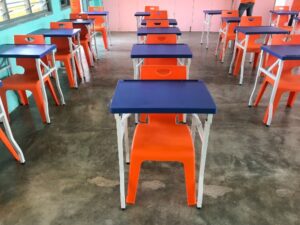Basic Education Minister Angie Motshekga addressed educators at the Quality Learning and Teaching Campaign forum on the significance of quality teaching despite the challenges of failing infrastructure.
The issue of failing school infrastructure in various areas of the country, particularly in rural and township schools remains in dire conditions. The Eastern Cape province is one example of many where alternatives such as teaching learners under trees has become the only option. Good and solid school infrastructure is important for children who live in remote areas to study and has proved to have a positive impact on the attendance and interest of learning between both teachers and learners. Therefore it is crucial to search for alternative solutions to building or restoring school infrastructure by drawing inspiration from engineers such as Nzambi Matee from Kenya who ventured into making bricks from plastic waste following her departure from the oil sector. Matee expressed that the idea was inspired by the build-up of plastic litter which has gradually become a global issue. ”I started by manufacturing one brick. After that, I thought, ‘Now that I have made one brick what do I need to make a thousand bricks? I need machinery.’ I saw the cost of the machines and realised that I could not afford them. So, I decided I would build the machines. I found a team of good smart people and we have pushed on slowly,” she said.Brick
The bricks are blow-molded from shredded polymer particles. Then stacked onto rectangular panels and covered with coating. The coating prevents the panels from being flammable and makes them water-resistant. Then they are laced with light-emitting diodes to provide low-cost lighting. The coated panels are then hung on a steel frame. In Côte d’Ivoire plastic has been used to create classrooms from non-PVC plastics which are cheaper, lighter, and more durable than conventional bricks. The objective set up by UNICEF is to transform all plastic waste into building materials for classrooms. Conceptos Plasticos, a Colombian social enterprise, has developed a technique to make bricks out of non-PVC plastics that are cheaper, lighter, and more durable than conventional bricks. According to the department’s national educational infrastructure (NEIMS) report published in April 2021, approximately 3,300 out of 23,276 schools – do not have reliable electricity supply and infrastructure in South Africa. Minister Angie Motshekga also revealed that Finance Minister Enoch Godongwana could allocate funds to the department in order to improve school infrastructure. Projects such as the transformation of plastic waste into bricks may assist in the development of SA’s schools’ infrastructure in less privileged locations.






